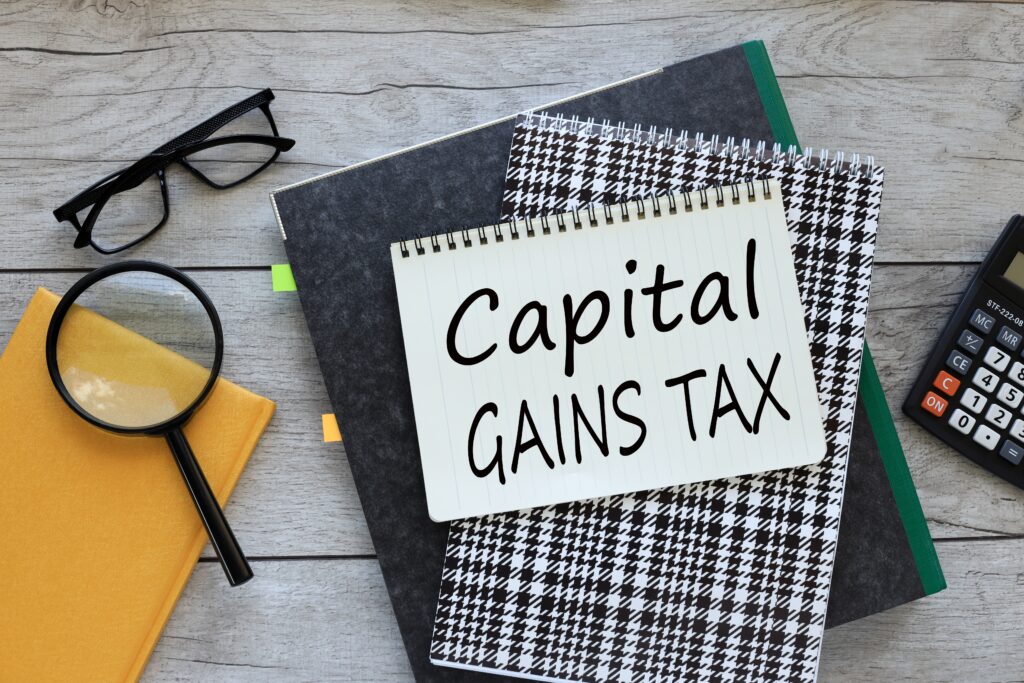
Navigating the intricate realms of finance and taxation often leads us to encounter the enigmatic term: Capital Gains Tax (CGT). Whether you’re a seasoned investor, a homeowner on the verge of selling a property, or someone who’s just bumped into this term, our goal here is to unravel the intricacies of CGT in the UK.
This blog post acts as your guide to CGT in the UK, covering the essentials from understanding what CGT is to exploring rates, exemptions, and practical tips to manage your tax liabilities effectively.
Let’s dive into the details.
Who’s in the CGT Arena?
Capital Gains Tax isn’t a one-size-fits-all scenario. It comes into play when specific individuals and entities profit from the sale or disposal of certain assets. Here’s a brief breakdown:
Individuals: UK residents are subject to CGT on gains from most assets, whether in the UK or abroad.
Non-UK Residents: They face CGT on the sale of UK residential property but are exempt from CGT on non-residential UK property from April 6, 2019.
Trusts and Estates: CGT can apply when trusts and estates dispose of chargeable assets, which include real estate, stocks, personal possessions, business assets, cryptocurrency, certain government securities, and more.
Unravelling the CGT Rates
Calculating CGT involves deciphering rates, exemptions, and reliefs. Key factors include:
Annual Exempt Amount: Each individual is entitled to an annual exempt amount (currently £6000 in the 2023-24 tax year), below which CGT isn’t levied.
Taxable Gain: This is calculated by deducting the asset’s cost and associated expenses from the selling price.
Tax Rates: Individuals face two CGT rates—10% for basic rate taxpayers and 18% on residential property gains; 20% for higher rate and additional rate taxpayers, and 28% on residential property gains.
Entrepreneurs’ Relief: If you’re selling a business, you might benefit from a reduced CGT rate of 10% under Entrepreneurs’ Relief, now known as Business Asset Disposal Relief, with a lifetime limit of £1 million.
CGT in the Business Arena
Businesses and companies also dance with CGT when they profit from the sale of chargeable assets. Considerations include taxable assets, Entrepreneurs’ Relief, indexation allowance, roll-over relief, and the now-extinct retirement relief.
CGT and Property: A Multifaceted Tango
CGT on property transcends mere buying and selling. It touches various scenarios:
- Selling Property: CGT might apply on the profit, excluding your main residence.
- Renting Out Property: Profits from selling a rental property can be subject to CGT.
- Inherited Property: CGT is usually calculated based on the property’s value at the time of inheritance.
- Gifting or Transferring Property: CGT can be triggered based on the property’s market value at the time of transfer.
- Property Development: Profits from selling developed properties might be subject to CGT.
- Second Homes and Holiday Homes: Selling these properties can trigger CGT.
- Principal Private Residence Relief (PPR): Relief may apply to exempt CGT on the sale of your main residence.
Settling the CGT Bill
Paying CGT in the UK involves a series of steps:
- Calculate Your CGT Liability: Subtract the cost and expenses from the selling price.
- Report to HMRC: Notify HM Revenue and Customs of your taxable gain.
- Register for Self-Assessment: If not registered, complete the process online.
- Complete Your Self-Assessment Tax Return: Include CGT details in your annual return.
- Pay CGT: Settle the tax owed, following HMRC’s calculation.
- Keep Records: Maintain thorough records for potential HMRC audits.
- Seek Professional Advice: For complex situations, consult tax professionals to ensure accuracy and compliance.
Annual CGT Allowance
The annual Capital Gains Tax Allowance, or Annual Exempt Amount, stands at £6000 in the 2023-24 tax year. This threshold allows individuals to make tax-free gains below this limit.
Utilizing this allowance strategically can help minimize overall CGT liability, especially by timing asset sales to span multiple tax years.
How Can Heighten Accountants Assist?
Heighten Accountants can be your guiding light through the CGT labyrinth:
- CGT Calculation: Accurately assess your CGT liability, factoring in exemptions, reliefs, and tax rates.
- Tax Planning: Devise strategies to minimize CGT liability through efficient timing and structuring of transactions.
- Record Keeping: Maintain thorough records for CGT compliance.
- Filing Tax Returns: Prepare and file your tax returns with precision.
- Advisory Services: Receive personalized advice for informed financial decisions.
- Compliance: Ensure adherence to deadlines and changing tax laws.
In conclusion, if you’re navigating the complex waters of CGT, Heighten Accountants can be your ally. Whether it’s CGT calculations, tax planning, record-keeping, or compliance, they’ve got your back.
Frequently Asked Questions:
How to avoid CGT?
Employ tax-efficient strategies, use the Annual Exempt Amount, explore reliefs like Entrepreneurs’ Relief, and time asset sales strategically.
When are CGT taxes due?
Typically, by the self-assessment tax deadline—January 31st following the tax year in which gains were made.
CGT rates in the UK for 2023-24?
Varying rates depending on income levels—10% or 18% for basic rate taxpayers, 20% or 28% for higher rate taxpayers.
Can you gift assets without CGT?
In some cases, yes, depending on the nature, relationship with the recipient, and asset value.
What is Entrepreneurs’ Relief?
Now Business Asset Disposal Relief, it offers a reduced CGT rate of 10% on qualifying gains up to £1 million, encouraging entrepreneurship and investment.



[…] Capital Gains Tax (CGT) on the Sale of Residential Property […]